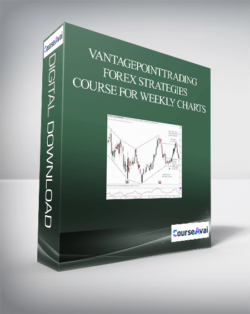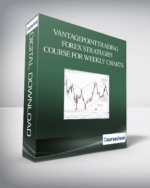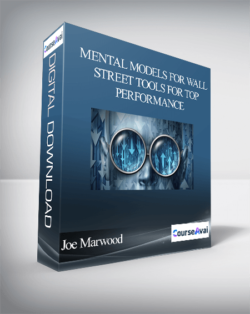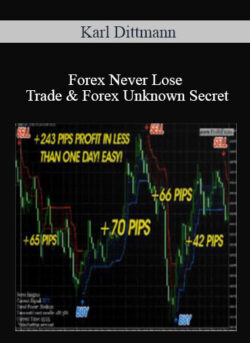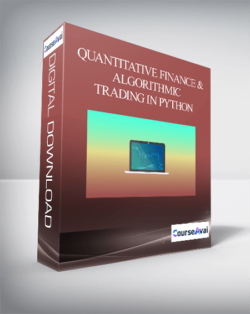The Stock Market Swing Trading Video Course provides everything new and experienced swing traders need to effectively and efficiently swing trade stocks. The coursePurchase Vantagepointtrading – Stock Market Swing Trading Video Course courses at here with PRICE $39.95 $9 Vantagepointtrading – Stock Market Swing Trading Video CourseThe Stock Market Swing Trading Video Course provides everything new and experienced swing traders need to effectively and efficiently swing trade stocks. The course covers how to analyze price charts, focusing on the few key metrics that really matter. Several strategies are revealed that stand the test of time, and work whether prices go up or down. It also covers how to find trades, stock market basics, how to place orders, position sizing, and risk management. These lessons reveal how we can win a good percentage of our trades, while still keeping our winning trades much bigger than our losing trades.Focus on these strategies, get good at implementing them and then repeat, repeat, repeat. The nice thing about swing trading (taking trades that last a couple days to a couple months) is that you only need to spend about 20 minutes every few days finding trades and implementing the strategies. This is done by watching the price of a stock move on the chart, and then buying and selling it when the strategies dictate.The Stock Market Swing Trading Course is produced by Cory Mitchell, a Chartered Market Technician (CMT), member of the Market Technicians Association, Canadian Society of Technical Analysts and by extension the International Federation of Technical Analysts. He became a full-time trader in 2005.Here’s a bit more about him: I worked for six years as a proprietary trader for a trading firm(s), doing one of the toughest jobs on the planet (also the most fun)-extracting profit every single month; if I didn’t make a profit, I didn’t get paid (no salary, everything was dependent on performance). These are stock strategies forged by relentless dedication to trading, and tens of thousands of trading hours and trades. In 2011 I moved my focus to trading independently and helping others by sharing what I’ve learned. I freelance (write) for, and have been vetted by, some of the largest financial sites in the world, including TheBalance, Stock & Commodities magazine and Investopedia, among others.The course is broken down into sections. Each section contains an educational component, where you are guided through a PowerPoint presentation. Then there is a component where charts are used to show how the information is applied.What You Will Learn in the Stock Market Swing Trading Video Course-One of the strategies in this course was used to provide signals on this site for 31 weeks. The signals generated a 49% return in that 31 week period. This involved a relatively large number of trades. If half the of trades were taken the approximate return was 25% over 7 months. The goal of the strategies is to generate 3% to 7% per month on average. This can be tweaked based on leverage, number of trades taken, win rate, and average reward:risk ratio. These variables are discussed in the course.-No frills, just solid trading education.—An efficient method of trading; I have included only the things you need to know, so you don’t waste your time reading or watching videos that don’t help you. Also, once you know the strategies, you can implement them in about 20 minutes every few days.—Receive more than 12 hours of video, a Trading Checklist eBook, and a Frequently Asked Questions (FAQ) eBook. Checklists make sure you are only taking trades based on the strategies and concepts discussed in the course.—How to effectively practice and implement the information you will learn. You will need to put in practice time if you want to get good at these strategies. I provide you with exercises throughout the course so can practice what you learn.—Learn all the stock market basics you need to start swing trading effectively and with confidence. —How to read stock price charts, and how to analyze them, including free resources you can use to practice your chart reading ability. For swing trading, you don’t need to spend loads of times analyzing the financial health of a company or reading news reports. Instead, swing traders focus on price charts. The price chart shows how the price of the stock is actually moving. It is the change in the share price that makes us money, so our job is to analyze the share price (I show you how) and then take advantage of trends and reversals within the share price.—How trends operate and reverse, and how to trade them, utilizing a trend-following strategy and a reversal strategy. During trends and reversals is where big money can be made…if you have strategies to capitalize on the trends and reversals (what this course is all about).-How to place trades (order types) for the strategies you will learn. What type of order is used for each trade can dramatically affect profitability. The course shows you which ones to use under various circumstances.-The course covers how to find and trade USA and Canadian stocks that meet the strategy criteria. The strategies and information can be used to trade other global stocks, but examples are not provided.—How to make money whether the price of a stock goes up or down.-What to do with your positions around earnings announcements or other major news events. —How to determine the exact number of shares to take when making a trade.—What type of stocks NOT to trade. There are certain types of stocks that are just too risky and that have a greater tendency to produce big losses. I discuss which types of stocks to never swing trade.Get immediately download Haled Vantagepointtrading – Stock Market Swing Trading Video Course—How to make sure wins are always bigger than losses. -Bonus Videos show you how to find and trade the Most Explosive Stocks in the Stock Market.-Learn how to collect massive gains from stocks that have entered a “sleeper” phase and are setting up for a big move.—To utilize this course effectively you should have $10,000+ in trading capital, and at minimum $5,000+.—Utilize the target method to get out of a winning trade, or use the versatile trailing stop loss method to capitalize on those stocks that keep running in your favor.Get the more than 12 hours of video instruction, a Trading Checklist eBook and a FAQ eBook for $249 USD. Make 2018 the year where you start building that secondary income stream.How much do you value your time?There’s loads of free trading information on the internet, but how much time are you spending trying to compile that information into a usable trading methodology? How much time is spent filtering through, well…crap? Save yourself the stress, time and confusion.(Note: The course download is a .zip file of approximately 3.5 GB. Be sure you have enough space on your computer/device for the download. Download speeds will vary. All videos are .avi format and the Checklist and FAQ eBooks are .pdf format. Download links are emailed out immediately; if you don’t see an email from us, check your junk mail.)This Stock Market Swing Trading Course is 100% Guaranteed:If you follow the steps and guidelines in this course and you don’t think you’re a better trader because of it, we will refund you 100% of the purchase price within 30 days*. We don’t guarantee trading profits-that’s up to you, and putting in the practice necessary-yet we do believe the information contained in this course will greatly improve your chances of becoming a profitable trader. Please note that you are paying for the course, and not personal mentoring. Personal trading advice is not provided with your purchase price. Risk disclosure: All views expressed in the Course are Cory’s opinion. The strategies contained in this Course are subjective in nature, which means they require practice and fine-tuning as you progress and as market conditions change. Individual trading results vary. Past performance of trade signals is not necessarily indicative of future performance. This Course should not be viewed as personal investment advice for you. We don’t know your personal financial situation, nor your financial goals or risk tolerance. Consult with your financial advisor before acting, as the opinions in the course may not necessarily align with your long-term goals or risk tolerance. All stock trading involves substantial risk of loss, and it is possible to lose more funds than you initially deposited with your broker if you are using leverage. For additional risk information on trading, see the Legal Disclaimer page.* Purchase price is refunded via PayPal. Refund must be requested within 30 days of purchase and an email sent to investing [at] vantagepointtrading [dot] com explaining why you are unsatisfied, and if you followed the guidelines as outlined.Rlingaa says:December 13, 2019 at 09:36HiPlease inform me the following about the “Stock Market Swing Trading Video Course”.1.Can this course be adopted to swing trading of Indian stocks as well ?2. Do you offer any discount on the purchase price ? Pls let me know.ReplyCory Mitchell, CMT says:December 16, 2019 at 16:44The concepts can be applied to any stock market, but the course only covers how to scan for US and Canadian stocks. You need to find a scanner for Indian stocks in order to look for the trade setups. TradingView looks like it would work (with India stock exchange data).ReplyPeter Hoffman says:October 23, 2019 at 14:05Hello Cori, I rate you site very highly, most generous & informative (i wouldn’t just say that, have waded though tons of rubble to get here).Have not started trading yet, but I started researching swing-trading and like your presentation of the video course.I have two questions:1) Is there any info on monitoring ‘Level2’ data included? (have heard its quicker and more direct – used by ‘pros’, ‘orderbook’ etc)…2) I also seen your ebook (forex and swing trading) although I like to start on ‘swing’ I wonder if the Video Course material also helps to learn a little about ‘Forex’ concepts?thanks for your help,peteReplyCory Mitchell, CMT says:October 28, 2019 at 11:17Hi Pete.There is no level 2 information. It is not relevant for the strategies presented.The methods in the course can be used for any market where the patterns occur, but only stock market examples are discussed and provided.Cheers,VantagePointTradingReplyAnonymous says:September 6, 2019 at 04:12Hi Cory:Is your swing trading course available to purchase. If yes, how do I purchase it and how much does it cost in USD?ReplyCory Mitchell, CMT says:September 6, 2019 at 17:18Yes, it is. We noticed the payment links aren’t working. Will have them back up and running hopefully soon. All the course details are on laid out on the Swing Trading Video Course page.Thanks for your patience!-AdminReplySam says:January 11, 2019 at 18:07Hi Cory,I ordered your course a couple of years and really enjoyed it. It taught me a lot. Somehow during transitioning to a new PC I lost Bonus Video #1. Is it possible to get that video again?Thanks,SamReplyVantage Point Trading says:January 22, 2019 at 10:30Hi Sam, glad you enjoyed the course! Check your emails and we’ll get this sortedReplyJason says:January 7, 2019 at 12:21Hi Cory,I need help with my download, which failed to complete. Please see my emails sent Dec 22, Jan 1, and Jan 6. Thanks!ReplyVantage Point Trading says:January 10, 2019 at 04:13Hi Jason, sorry about the delay, you should have received it now, let me know if you have any issues, thanks!ReplyVJ says:August 23, 2018 at 10:19Hi Cory,I have few questions before I decide to purchase your Swing Trading course.1. How do I communicate with you if I have questions while going through the video course? Do you have a chat forum or something where I can post a question and get answers?2. Once I start real trading after finishing the course, do you also answer any questions I might have and provide assistance with real trades?3. Do you plan to have a community where traders can post questions and discuss their trades?Thanks,VJReplyCory Mitchell, CMT says:August 23, 2018 at 16:04Hi VJ,The best way to ask course-related questions is right here in the comments. I typically respond within a day or two. There is currently no chat room or forum, but that is a good idea. Will discuss the possibility of this with the tech crew. As of right now though, there are no plans for a forum.Personal trading advice is not provided. I can’t legally tell you whether to take a trade or not. But, if you provide a couple examples I can explain what I see and whether it fits the strategy or not. This would be limited to a couple examples, since personal mentoring is not included in the course fee. (To share an example, upload a screenshot of the chart with your comments/analysis to any cloud-based storage provider and then paste the link for the chart in a comment..or on TradingView you can share a chart by clicking the camera in the upper right corner and sharing the link in a comment)ReplyVJ says:August 30, 2018 at 14:11Hi Cory,Thanks for the response. Also, in the video course, do you explain based on real trade examples or is it primarily just slides? I am looking for video tutorials with real trade examples with entry/exit criteria.ReplyCory Mitchell, CMT says:August 30, 2018 at 16:05Yes, lots of real trade examples. Each section goes through a slide, and then to the charts for examples, then back to the slides, then examples, and so on. Exactly how to enter and exit, including what order types to use, is covered.ReplyRoh says:August 4, 2018 at 13:36Hi Cory,I’m wondering if after consolidation breakout entry and you get a sharp false breakout against you, do you ever reduce size or perhaps exit the position early? Or you are more set it and forget it? Thanks.ReplyCory Mitchell, CMT says:August 6, 2018 at 08:15If I expect the price to move quickly in my favor, and instead it moves sharply against me, I MAY cut the loss early because my expectation was wrong.Get immediately download Vantagepointtrading – Stock Market Swing Trading Video CourseBUT, this doesn’t apply to every trade. The best thing to do is look through all your demo and live trades and see which method works best for you. I decide before each trade how I am going to exit. For example, on a rounded bottom the price is often moving in a bit choppier fashion so I know it may take a bit of time for the price to make an aggressive move in my favor, so I give the trade some room. Look at the recent price action and determine if you want to give the trade a bit of room, or cut quickly if it moves against you. Stick to that plan for that trade.If uncertain, then use the set-and-forget approach.ReplyVin says:June 26, 2018 at 11:16Hi Cory,I sent you an email regarding the course pricing and I didnt receive any response from your support. What is the best email to reach you?ReplyCory Mitchell, CMT says:June 27, 2018 at 08:59Sorry about that. I don’t look after email, but I will let support know your email was missed.What did you want to know about the course?ReplyVin says:July 4, 2018 at 21:55Any July 4th deal on your course at this time?ReplyCory Mitchell, CMT says:July 4, 2018 at 22:17Hi Vin,There are no sales/deals planned currently.ReplyJason Gaviria says:May 19, 2018 at 12:29Hey Cory,I recently purchased your swing trade course after subscribing. We had the power knocked out on this side of the east coast due to the recent storms and it interrupted the DL of the ZIP. I have the Paypal Receipt, but I can’t seem to re-try the DL. It won’t allow me anywhere I look to re-start it. Can you please help!!-JasonReplyCory Mitchell, CMT says:May 19, 2018 at 13:51No worries Jason, and sorry about the troubles.I sent you an email with an alternative download method. You should have it in your inbox now.Best wishes with the tradingReplyGet Vantagepointtrading – Stock Market Swing Trading Video Course downloadWill Chan says:April 7, 2018 at 04:07Hi Cory, how long does it takes to screen stock for swing trade? Does your course teaches how to use TC2000 stock screener or ThinkorSwim?ReplyCory Mitchell, CMT says:April 7, 2018 at 09:12Hi Will,I usually limit my scans to about 20 minutes/night. How often a person wants to scan and place trades is up them. THey can scan every night, but 1 to 3 nights each week is sufficient. I usually only scan 1 or 2 nights a week.Thinkorswim is fine. I do not discuss TC2000, although you could use it (or the Thinkorswim scanner) if you want.In the course, I only discuss screening software that is freely available to everyone, such as Finviz and StockRover which provide all we need, and I also touch on StockFetcher.ReplyMark Viljoen says:March 20, 2018 at 19:24Hi Cory,You have often discussed the minimums requires to effectively utilize your course and I have read numerous articles of yours where you have clearly pointed to the fact that there will come a limitation in terms of you reaching a market cap, where after the slippage you experience makes larger capital investment require extensive modifications to any individuals trading methods and such a considerable increase in the time investment as to become less of an attractive proposition.That being said, what would you estimate, on average, would potentially be the largest account size you believe an average trader may be able to effectively utilize using your swing trading methods, whilst still maintaining an average of say 10% per month returns, given:1) They follow only the exact basics taught in your course?and2) They introduce relatively simple but experiential based tweaks without getting too complicated or time intensive? That is to say they follow your teachings to developing a personally tried and tested, proven basic strategy of their own that is built upon your methodology and their individual psychological risk profile, that would form the foundation of their regular trading but does not include the extra tweaking you speak of when their account becomes a little too clumsy and stars experiences slippage.I only ask as I have been preparing quite a detailed trading and investment 10 year plan that includes other investment short, medium and long term that also include physical trading of actual goods and the development of a property investment portfolio for rental and resale purposes and I have been trying to set a guide line budget for swing and forex trading, such that when their accounts reach a cap of say $200,000 then the excess funds are automatically directed to longer term investments.put into a “picture” form I envision a pyramid tower of champagne glasses with the first glass being the smallest and yet most profitable cap say to day trade, rapidly spilling over into the next larger level (cap) to swing trade, spilling over into the next level, to trade shares, particularly options, the next level to invest in dividend stocks ( still using options to get int and out) and investment properties for resale, spilling into the last level of long term stocks, bonds and rental properties, which would ultimately “spill” what I would then see as my genuine personal monthly income. Thus each level of champagne glasses can only accommodate a maximum market cap before their risk/ return becomes inefficient and hence needs to spill out and be better employed in the next and it is these ” champagne glass levels” or maximum market caps that I am trying to realistically and honestly budget.Many thanks for your extremely helpful and informative articles!MarkReplyCory Mitchell, CMT says:March 21, 2018 at 11:41Good questions…and very good you have a plan Expecting 10%/month is quite high. In the course, I show the math for making 3% to 5% per month. This can be tweaked, higher or lower, by talking higher reward:risk trades or more trades, or using leverage, or improving the win rate.I mainly talk about the “caps” to show that there is a difference between trading 100K or even 1 or 2 million and trading a billion. Often people hear about short-term traders making high returns and they doubt it is possible because most hedge funds make 15% or less per year. But trading a million and trading a billion are totally different games. So that is the main distinction I am making.As for swing trading, at about $3million (as a very rough estimate) it will start to become more difficult. The course discusses two position sizing methods, so typically the capital in the account will be spread over about 5 to 10 trades (for this amount of capital, 10 or more is recommended). At 10 trades, with a $3M account, that means taking about $300K worth of stock on each trade. Now that is super easy on a stock like Netflix ($316 currently)…just grab 1000 shares. There is lots of volume. But if you come across a $10 stock with a great trading opportunity, you need to buy 30,000 shares. That stocks has to have a lot of volume to get all those shares at the exact price you want.This problem can be somewhat eliminated by trading higher priced stocks, and stocks with lots of volume. The more capital you have, likely the higher you will need to push the volume and price requirement. But this, of course, narrows the number of opportunities you will come across. Another option is to spread the capital across more trades. Say 15 or 20…that way less capital is flowing into each stock making it easier to accumulate the shares required. Here again, we have a bit of a problem though…it is much harder to find 20 good trades than it is to find 5 or 10.So up to a million or two isn’t too bad, then after that you likely need to start restricting your screening criteria quite a bit and making some sacrifices. At that point, you could start diverting more funds toward longer-term term trades…per the plan you talked about.Each trader is different and if you only trade high priced high volume stocks you may be able to up that limit. That said, most people would LOVE to eventually have this problemReplyMark Viljoen says:March 21, 2018 at 16:33Thanks for the advice.Just a point I only mentioned an average of 10% since after reading one of your earlier articles “how much can day traders expect to make” I think it was, you suggested that it is possible that experienced and hence successful traders could make around 15% trading Forex, 10% swing trading and that “good traders” could make around 20% per month.I don’t expect to jump to the top of the heap overnight but I am prepared to do whatever it takes to get there and some one once told me that the ultimate levels of achievement in any field of endeavor are really no different between any two given people but that quite simply one of the two may have to put in a hell of a lot more effort and blood sweat and tears to get there.Now I sincerely appreciate your standing advice that trading should NOT be about the money but in fact about the “lifestyle” however you need to understand that for me it has to be a little of both since I am driven ( with no other options, like being side tracked by lucrative oil industry position like some of the people you knew! lol) to make this the way that I can support my family and therefore not viewing it as a secondary income.I’d love to have that luxury but as a 56 year old white male in South Africa I have endured nearly fifteen years of doors closing in my face in the name of Affirmative Action and I am therefore utterly determined to take what little talent or intellect I may or may not have and sweat as many hours, days, nights, weeks, months and upcoming years to master trading to the very best of my ability so that I can once again be able to really give my family what they deserve in terms of a solid, secure home and support.I have studied everything I can with very limited funds over the internet and over the last three years I have sorted through hundreds of “miracle millionaire makers” over the internet and even tried one or two but have narrowed my focus down to the likes of Tim Sykes, Jason Bond, Marcello Ambriedes, Bill Poulos, a south african chap Timon Rossilimo and the top spot has always been held by your teachings and articles.Your guidance has always proven totally honest, sometimes brutally so! and I take very seriously all of your articles of which I have tried to copy and paste into a kind of basic trading tutorial and then I attempt to put them into practice in a demo account and I am slowly but very surely getting there and will not stop until i do! and most importantly as per your advice I will not risk a cent until I am certain I can proficiently and repeatedly maintain a consistent profit in the demo accounts.ThanksMarkReplyTim says:March 14, 2018 at 13:28Cory,Just wanted to say thank for the work that you do and the resources you provide here. I recently purchased your swing trading course and in my first month showed a $500 profit on a 5k account. Two weeks in to my second month, I’m already up $1200.The layout of the course is exceptional and easy to understand from start to finish. I have limited experience trading(around a year) and I had no trouble wrapping my mind around the course.Thanks again and best wishes,TimReplyElsa says:March 9, 2018 at 14:16Hello Cory,I’ve been reading your site with interest after deciding I’d like to swing trade stocks. I’ve dabbled in the crypto market for some time, but haven’t really gotten into share trading yet. I know that you’re aiming at the US market when you say to have 5-10k (USD) capital to start swing trading because of how much capital is invested/held up in each trade.However in Europe, as you might know, we can trade in CFDs with quite small margin requirements (even smller if you use spread betting in the UK, which is like the old-style bucket shops). If you’re in a country where CFDs are offered then would it be possible to use your strategies, taking advantage of the margin and therefore starting with a smaller amount of capital? Unless there’s some value I’m not aware of that you benefit from by holding the underlying asset itself? In the case of spread betting in the UK, I presume this is also advantageous for tax since “wins” are tax-free. Would love to hear your thoughts. Thanks.ReplyCory Mitchell, CMT says:March 14, 2018 at 07:54Hi Elsa,Sorry for the late reply. Was on the road.Yes, you can trade CFDs. The strategies would work the same as the CFDs move the same as the stock.The only problem would be that CFDs are not offered on ALL stocks. In the course I show you how to scan for stocks that meet our strategy criteria. Each week there is a usually a handful and then the one or two you like the best are selected.There is no guarantee that the stocks you find will have a CFD available for trade.So CFDs will limit you in this regard. On this flip side, you can simply choose to trade the strategy setups when they appear in the CFDs you do have access to.Overall thought is this: the strategies work with CFDs, but you may have fewer trading opportunities because CFDs may not be available on every stock there is a trade setup on.ReplyAir says:January 2, 2018 at 07:57Hello,Do you have a performance log of the strategy you’re selling please ? In order to know what to expect when the strategy is well apply.I know it’s depend on each trader but what are you performances please.Regards,AirReplyCory Mitchell, CMT says:January 2, 2018 at 09:04Hello Air,I don’t typically publish results because every trader will have dramatically different results, even if using the same strategy. Small mistakes or differences of opinion on a trade will inevitably lead to different results, especially over many trades. People may also opt to use different levels of leverage, or take more or less trades. So my personal profits are not comparable to what others will make. Some people will make less than me, some will make more.Get immediately download Haled Vantagepointtrading – Stock Market Swing Trading Video CourseBUT, at times in the past I have provided trade signals on the site based on strategies very similar to those covered in the course. These trades and results were published on the site.Here are the results for stock swing trades:[percentages are account equity, not how much the stock moved]Stocks 20% in 6 weeks: http://vantagepointtrading.com/trending-stocks-watch-profitability-review-20-3-Purchase Vantagepointtrading – Stock Market Swing Trading Video Course courses at here with PRICE $39.95 $9
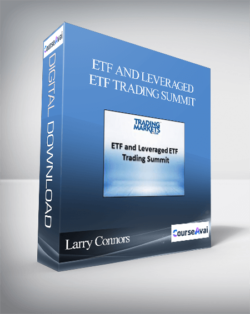 Larry Connors – ETF and Leveraged ETF Trading Summit
₹8,964.00
Larry Connors – ETF and Leveraged ETF Trading Summit
₹8,964.00
 Hale Dwoskin – Sedona Method – Facilitator Training 2018
₹18,924.00
Hale Dwoskin – Sedona Method – Facilitator Training 2018
₹18,924.00
Vantagepointtrading – Stock Market Swing Trading Video Course
₹1,494.00

